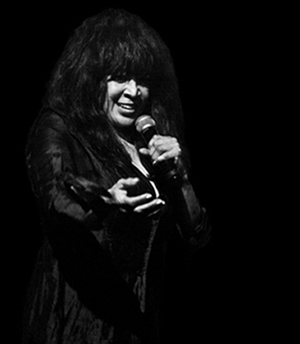Ronnie Spector
Live at the City Winery, NYC 7-14-2012
by Michael Sherer
Posted: Aug 2012
(3048) Page Views

Ronnie Spector - photo by Michael Sherer
It was nearly fifty years ago when Ronnie Bennett, then 16 and living in Spanish Harlem, went with her sister Estelle and cousin Nedra to audition for a record producer very much on the rise, Phil Spector. He would become known for his “Wall Of Sound” and being a hit machine in the first half of the ‘60’s. Spector, originally from the Bronx, was bowled over within seconds of hearing lead singer Ronnie vocalize. He excitedly exclaimed that this was the sound that he’d been searching for. He immediately signed them to his two year old Philles record label and christened them The Ronettes. They were to be one of Spector’s flagship acts, and set a high bar for all such “girl groups” to follow.
This was one of the first stories of Ronnie’s life that her audience heard from her as she read from an i Pad during her engaging production of “Beyond The Beehive.” It consists of Ronnie telling the story of her life while seated, and standing up throughout to sing some of the hits that the Ronettes had throughout their short career, which spanned from ’63 through ’67. Unfortunately, a few of their biggest and most loved songs, such as “Be My Baby,” “Baby I Love You” and “Christmas (Baby Please Come Home)” could not be performed, due to Phil’s refusal to grant permission for their use in a theatrical production. Ronnie explained that she can sing the songs in a standard concert, but a scripted show like this requires a song publisher’s approval.
“Walking In The Rain,” from ’64, was one that did get performed. Ronnie said it’s her favorite Ronettes song. She noted that it was done in one take, which she said hardly ever happened in the ‘60’s. She went on to say that it was especially rare with Phil, who was a total perfectionist.
We also learned from Ronnie that fellow New Yorkers Frankie Lymon & The Teenagers was her biggest influence musically, and that she initially didn’t know if the pubescent Frankie was a boy or girl. (Tragically, Lyman would ultimately overdose from heroin in his grandmother’s bathroom in ’68, aged 25.)
In going back to Ronnie and Phil first meeting, Ronnie spoke about how Phil was not only obsessed with her voice, but basically everything about her. She would painfully discover that he wanted and would have a great deal of control over her. They married in ’68, a year after Phil ended the career of The Ronettes. Phil’s main impetus in marrying Ronnie was to have the control over her that he so strongly sought. Ronnie explained that when they moved from NYC to a mansion in Los Angeles in the mid ‘60’s, she was literally held captive in it until she had to escape barefoot with her mother and go back to NYC. Phil didn’t let her wear shoes in order to keep her from going far, but she did anyway. This was at the dawn of the ‘70’s, when Phil’s winning streak was behind him.
It’s this disturbing history of domination and manipulation that is the thrust of the production, as it was Ronnie’s bleak existence throughout much of the time she was with Phil. (It would get progressively worse as they went on.) Ronnie is still visibly traumatized by it all, and started to tear and choke up at times while speaking. She also conceded to being nervous using the i Pad, which malfunctioned a couple of times. When Ronnie stood up and sang though, the nerves and lingering torment ostensibly disappeared. She’s a true pro when performing, and lets nothing get in the way.
Ronnie has a fine band and back up singers to support her. Another form of embellishment is the use of projected photos on screens behind Ronnie, on both sides of the stage, that go along with her dialogue. This is an effective and important element of the production.
Ronnie looked lithe and sleek, dressed all in black. She appears to be as trim as she’s ever been, after having been overweight at times as she’s battled with alcoholism since leaving Phil. This stemmed from his threats of putting not only an end to her career with out him, but even her life. He turned her into a nervous wreck.
Given that this is essentially a story of her overcoming all the madness that is Phil, one of the most uplifting stories told by Ronnie is of her and the other two Ronettes having won a lawsuit they filed in ’03 against Phil for unpaid royalties. They won a three million dollar settlement a couple of years ago, around the time that Phil went to prison for a murder charge that took place in his mansion. Surely, the charge was no real surprise to Ronnie, who explained that she feels that if she had stayed with Phil long enough, she too would have been killed by him. Phil was rather obsessive with guns for decades, and would wave one around frequently.
When Ronnie sang “Time Is On My Side” by the Rolling Stones, with whom the Ronettes toured with, she said quite appropriately: “Time’s on my side. The other person’s in prison.” How liberating it must be for Ronnie to be alive and kicking in her hometown to an audience that knows there’s much more to this literal and figurative survivor than a beehive wig and maniacal husband pulling all the strings.